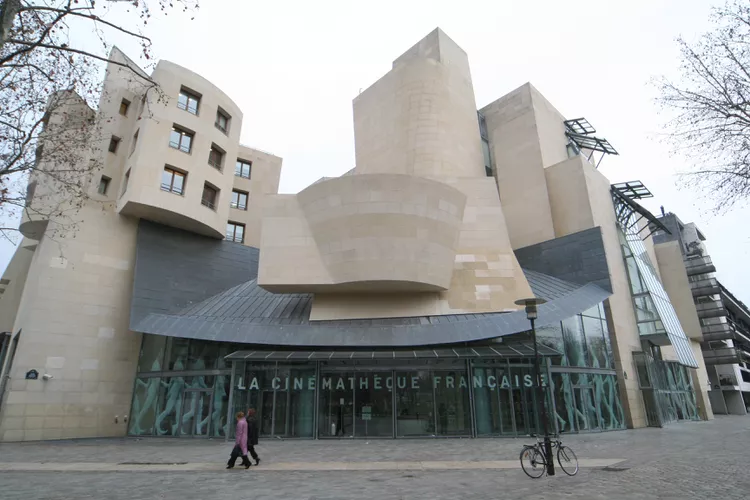1. Overview of the Cinémathèque Française
Discover the history and experiences offered at the Cinémathèque Française Film Center and Museum, a must-visit for cinema aficionados in Paris.
2. Features of the Cinémathèque
Explore regular retrospectives on classic directors, films, and unique exhibitions related to film history.
3. Visitor Information
Find the location, opening hours, and ticket information to plan your visit effectively.
Pretty much a required destination for movie lovers visiting the city of light, the Cinémathèque Française Film Center and Museum is dedicated to all things celluloid, past and present. Housed in a building designed by renowned architect Frank Gehry– which is noteworthy in its own right– the Cinémathèque includes a film museum with a permanent exhibit exploring cinema throughout its short but vibrant history. It also hosts frequent temporary exhibits paying homage to specific film directors, national film traditions, or periods in movie history.
Regular Retrospectives on Classic Directors and Genres:
The center’s screening rooms host multiple retrospectives on classic films and directors, highlighting up-and-coming directors and actors. The Cinémathèque also includes a film library where scholars and curious cinephiles can browse a large collection of film posters, stills, photographs, and reviews. In short, if you’re interested in film history, particularly French cinema from the early 20th century to the present day, reserve some time for an afternoon or two at this unique spot.
:max_bytes(150000):strip_icc():format(webp)/paris-night---metro-on-a-bridge-981483590-5c31750f4cedfd0001411bfc.jpg)
Location and Contact Information:
The Cinémathèque is located in the 12th arrondissement (district) of Paris, south of the Seine River and not far from the surprisingly contemporary, up-and-coming neighborhood around the National Library (Bibliothèque Nationale). It’s also in close reach of lesser-known (but pleasantly green) outdoor attractions such as the Parc de Bercy and Promenade Plantée, a romantic walkway constructed over a defunct railway line.
Address:
51 rue de Bercy
12th arrondissement
Metro: Bercy (line 6 or 14)
Tel : +33 (0)1 71 19 33 33
Opening Hours and Tickets:
Center and Cinemas: Open Monday through Sunday. Closed Tuesdays, December 25th, January 1st, and May 1st. Cinema ticket counter opens daily at 12:00 pm (10:00 am on Sundays).
Cinema Museum Opening Times: Open from Monday through Saturday from 12:00 pm to 7:00 pm; Sundays from 10:00 am to 8:00 pm. Closed on Tuesdays, December 25th, January 1st, and May 1st.
Cinema Library Opening Times: Monday, Wednesday, Thursday, and Friday from 10:00 am to 7:00 pm; Saturday from 1:00 pm to 6:30 pm. Closed Tuesday, Sunday, and on French bank holidays.
Tickets: Admission to the permanent collections and displays is free for all visitors. Entry prices vary for temporary exhibits: call ahead. Entry to temporary exhibitions is free for visitors 13 and under.
:max_bytes(150000):strip_icc():format(webp)/Promenade_plantee-59cd1b28845b340011b02491.jpg)
Sights and Attractions Nearby the Cinémathèque:
- The National Library District
- Promenade Plantée and the Viaduc des Arts (great for a stroll)
- The Bastille/Gare de Lyon Neighborhood
- Butte aux Cailles Neighborhood
Visit Highlights:
The Cinémathèque has a lot to offer; therefore, if you want to get the full experience, we suggest allocating an entire afternoon to explore the permanent and temporary exhibits at the film museum, followed perhaps by a screening in the evening.
The Museum
A veritable treasure trove of objects and archives related to celluloid history, the permanent collection at the Cinémathèque features hundreds of artifacts. The museum traces the history of film through the development of magic lanterns and optical instruments, showcasing how burgeoning new technologies in the 19th century ultimately led to innovations in moving film. The legacies of film pioneers such as the Lumière Brothers and Georges Méliès are explored in the historical exhibit.
Other noteworthy sections of the museum display legendary costumes, collections of scripts, notes and drawings, film posters, and other artifacts. Scenes from films that marked celluloid history are played throughout, ranging from Hitchcock to Fritz Lang, Charlie Chaplin, or François Truffaut. Temporary exhibits have recently focused on Fritz Lang’s Metropolis, Stanley Kubrick, and Jacques Tati. For an insightful experience, visit the museum to discover its vast collections.
Screenings and Retrospectives at the Cinémathèque:
The center hosts numerous retrospectives and thematic film programs each year. These often align with the temporary exhibits at the museum, focusing on specific film directors, genres, periods, or national cinematic heritage. Therefore, attendees are encouraged to check the current program for details on screenings and events.




